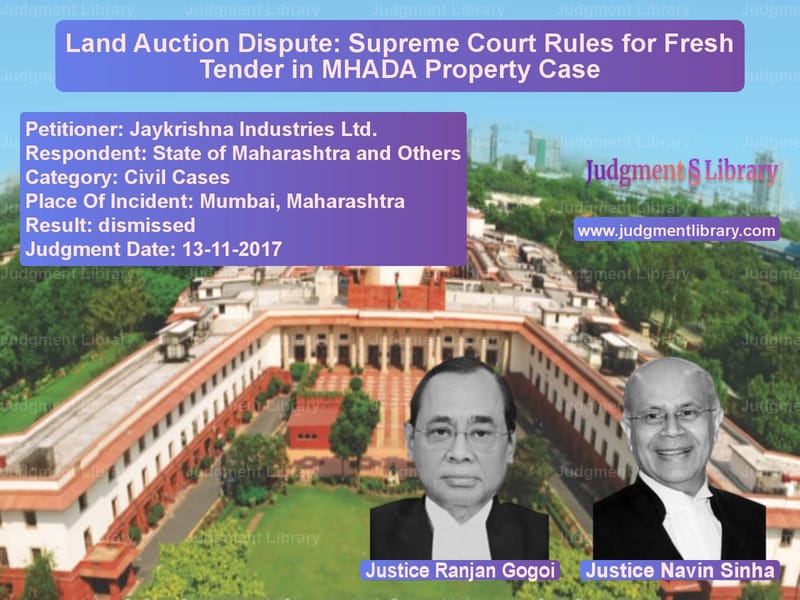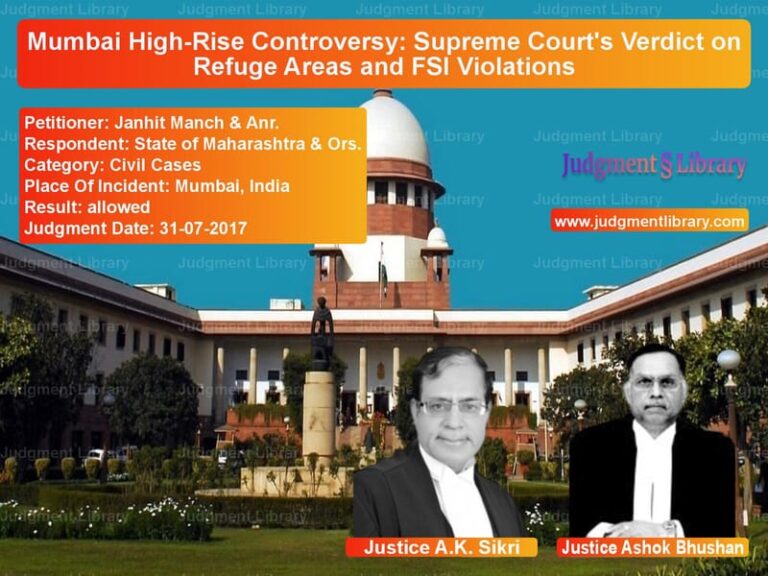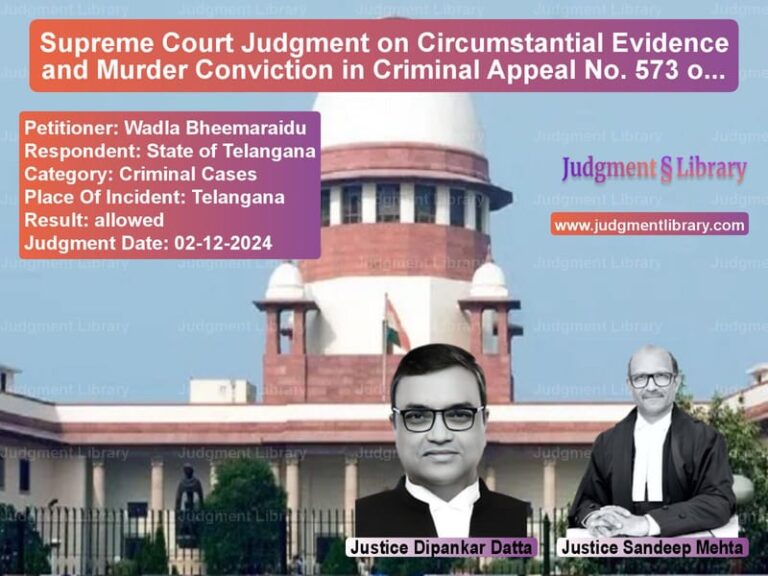Land Auction Dispute: Supreme Court Rules for Fresh Tender in MHADA Property Case
The Supreme Court of India recently delivered a significant judgment in the case of a contentious land auction dispute involving a 10,000 square meter plot located in Powai, Mumbai. The case revolved around the auction settlement conducted by the Mumbai Housing and Area Development Board (MHADA) and the subsequent litigation arising from competing claims over the land. The legal battle was fought between M/s. Popcorn Properties Private Limited and M/s. Jaykrishna Industries Ltd., with the State of Maharashtra and MHADA as the respondents.
The case was deeply entrenched in procedural lapses, allegations of political influence, and legal complexities regarding government land settlements. The core issue was whether the land in question should be awarded to the highest bidder in the original auction or if a fresh tender process was necessary due to changes in permissible land use and the passage of time.
Background of the Dispute
On November 17, 2004, MHADA published an auction notice inviting bids for a commercial development project on the disputed land. Jaykrishna Industries Ltd. emerged as the highest bidder, offering Rs. 22,22,22,300. Following this, on December 17, 2004, MHADA provisionally accepted the bid and directed the petitioner to deposit 25% of the amount, which was duly paid on January 3, 2005. However, the remaining 75% was yet to be deposited pending further communication from MHADA.
Unexpectedly, MHADA engaged in parallel negotiations with the respondent, Popcorn Properties Private Ltd., leading to a legal dispute. The respondent claimed a pre-existing right to the land based on negotiations with MHADA dating back to 1999. The respondent subsequently submitted a higher bid, leading to the cancellation of the petitioner’s bid on May 7, 2005. This prompted the petitioner to challenge the cancellation through various writ petitions.
Arguments of the Petitioner
Senior Counsel Shekhar Naphade, representing Jaykrishna Industries Ltd., argued that the petitioner’s bid was the highest and was legally accepted, thus entitling them to the settlement of the land. The petitioner asserted that MHADA’s decision to entertain an alternate bid from the respondent was illegal and politically influenced.
The petitioner made the following key submissions:
- Once the bid was provisionally accepted, MHADA had no authority to engage in further negotiations or cancel the bid arbitrarily.
- The respondent had not even participated in the original auction, and its subsequent bid submission was unlawful.
- The cancellation of the petitioner’s bid on May 7, 2005, was done without due process and was influenced by political pressure.
- The High Court was misled regarding the status of the petitioner’s bid, which had already been provisionally accepted.
- If fresh tenders were to be issued, the petitioner should be given the right of first refusal or at least partial settlement of the land.
Arguments of the Respondent
Senior Counsel Sanjay Hegde, representing Popcorn Properties Private Ltd., contended that the respondent had a pre-existing claim to the land due to prior negotiations with MHADA in 1999. The respondent argued that it had legally increased its bid and had made payments accordingly.
The respondent further asserted:
- The petitioner had no vested right in the property as no final allotment was made.
- The cancellation of the petitioner’s bid was justified given the respondent’s prior claim and its willingness to pay a higher amount.
- Any settlement should be done at market price, considering the increased value of the land over time.
MHADA and State of Maharashtra’s Position
MHADA and the State of Maharashtra maintained that the land use had changed from commercial to residential and that a fresh tender process was necessary. They submitted that no final allocation had been made under the original auction and that proceeding with an outdated bid would not serve public interest.
Supreme Court’s Judgment
After carefully considering the arguments and reviewing the procedural history, the Supreme Court ruled in favor of a fresh tender process. The court emphasized the following:
- Government land cannot be settled through private negotiations, and an open auction is necessary to ensure transparency.
- The respondent’s claim of a pre-existing right was invalid, as the 1999 negotiations had been annulled in 2000, a fact the respondent failed to challenge.
- The petitioner’s bid, although provisionally accepted, was never finalized, and their delay in contesting the cancellation weakened their case.
- Given the significant changes in permissible land use and the passage of time, a fresh auction was the only viable solution.
Consequently, the court dismissed all appeals and directed MHADA to refund deposits made by the parties. The petitioner was granted interest on their deposit until June 24, 2005, at a rate of 8% per annum.
Conclusion
This judgment reinforces the principle that public land must be allocated through transparent processes rather than backdoor negotiations. The ruling ensures that valuable government properties in cities like Mumbai are allocated fairly, benefiting the public and generating maximum revenue for the state.
Don’t miss out on the full details! Download the complete judgment in PDF format below and gain valuable insights instantly!
Download Judgment: Jaykrishna Industrie vs State of Maharashtra Supreme Court of India Judgment Dated 13-11-2017.pdf
Direct Downlaod Judgment: Direct downlaod this Judgment
See all petitions in Property Disputes
See all petitions in Specific Performance
See all petitions in Damages and Compensation
See all petitions in Judgment by Ranjan Gogoi
See all petitions in Judgment by Navin Sinha
See all petitions in dismissed
See all petitions in supreme court of India judgments November 2017
See all petitions in 2017 judgments
See all posts in Civil Cases Category
See all allowed petitions in Civil Cases Category
See all Dismissed petitions in Civil Cases Category
See all partially allowed petitions in Civil Cases Category







